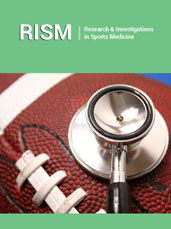- Submissions

Abstract
Research & Investigations in Sports Medicine
Impressions of an Electrolyte Hydration Beverage among Individuals Participating in Collegiate Soccer
-
Open or CloseSA Cage1*, AP Jacobsen2, RL Peebles2, J Gibson2, D Lege1, EJ Bobel2 and RX French2
1The University of Texas at Tyler, USA
2The University of Texas Health Science Center at Tyler, UT Health East Texas, USA
*Corresponding author:SA Cage, The University of Texas at Tyler, USA
Submission: September 11, 2024;Published: September 19, 2024

ISSN: 2577-1914 Volume10 Issue5
Abstract
It is well documented that physically active individuals participating in exercise under frequently encountered environmental conditions regularly experience mild to moderate dehydration. Previous research has shown that dehydrated individuals exhibited decreased cognitive and physical performance during physical activity. As such, ensuring individuals are properly hydrated during exercise is of critical importance to sports medicine healthcare providers. Therefore, the purpose of this study was to describe the opinions of individuals participating in collegiate men’s and women’s soccer related to an electrolyte hydration beverage. A secondary purpose of this study was to describe the effect of the examined beverage on gastrointestinal health. A total of 61 individuals participating in collegiate soccer (age=21±2 years, Male=25, Female=36) from an NCAA Division II institution were enrolled in this study. During preseason training camp, participants were provided with enough electrolyte hydration beverage powder (Ever Lyte® sticks, Kent Precision Foods Group, Inc., Muscatine, IA) to be able to drink two of the beverages per day. Following consumption of a serving of the electrolyte hydration beverage, participants were instructed to fill out an electronic survey. The survey included questions collecting information about demographics, the participants’ impressions of the beverage, and gastrointestinal symptoms following drinking the beverage. 95% (N=58) of the participants answered “Like Extremely”, “Like”, or “Like Somewhat” when asked about their overall impressions of the beverage. Out of the 61 participants, only five reported a mild increase in gastrointestinal symptoms. After consuming the beverage, four participants reported mild bloating, and one participant reported mild acid reflux. No participants reported moderate to severe gastrointestinal symptoms after drinking the beverage. This study demonstrated that the tested electrolyte hydration beverage was well received by the tested group of individuals participating in collegiate soccer. Sports medicine clinicians attempting to improve the hydration behaviors of their patients should consider using a similar hydration strategy. Future research should study the impact of electrolyte beverages on muscle performance during exercise, and hydration status during and after exercise. In the interim, clinicians should seek out hydration options that encourage regular fluid intake by their patients.
 a Creative Commons Attribution 4.0 International License. Based on a work at www.crimsonpublishers.com.
Best viewed in
a Creative Commons Attribution 4.0 International License. Based on a work at www.crimsonpublishers.com.
Best viewed in 







.jpg)






























 Editorial Board Registrations
Editorial Board Registrations Submit your Article
Submit your Article Refer a Friend
Refer a Friend Advertise With Us
Advertise With Us
.jpg)






.jpg)














.bmp)
.jpg)
.png)
.jpg)










.jpg)






.png)

.png)



.png)






